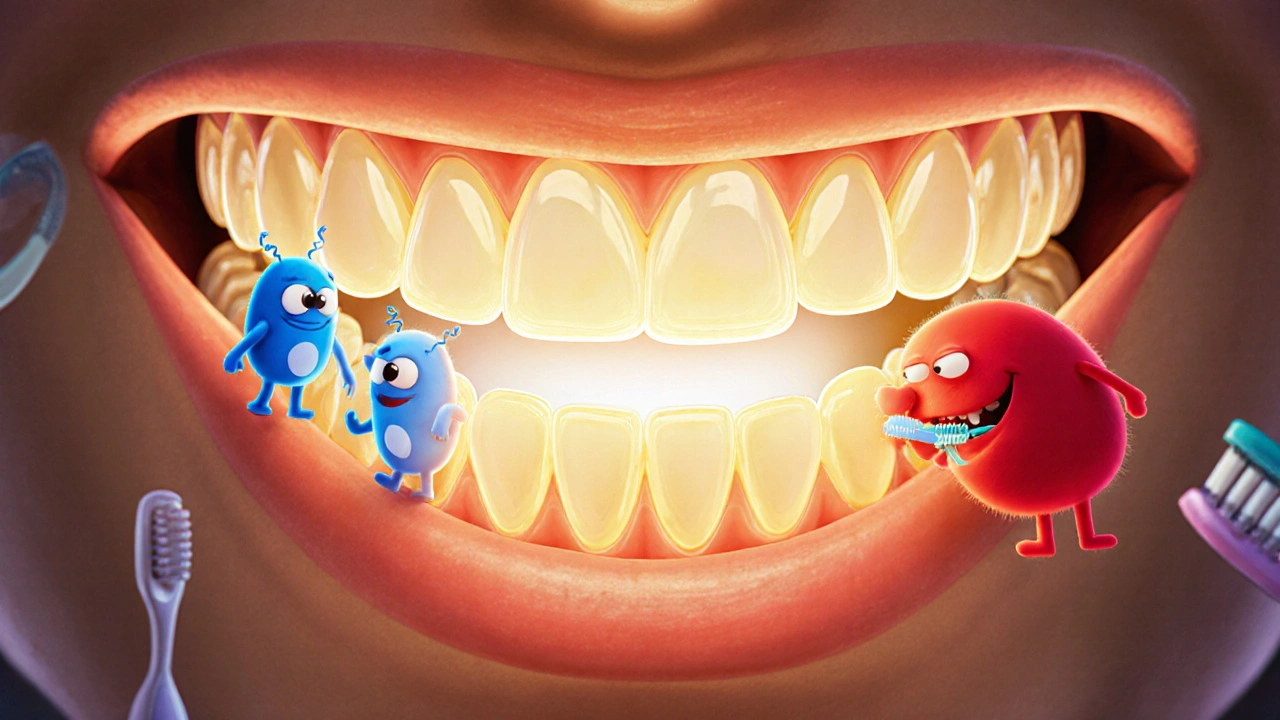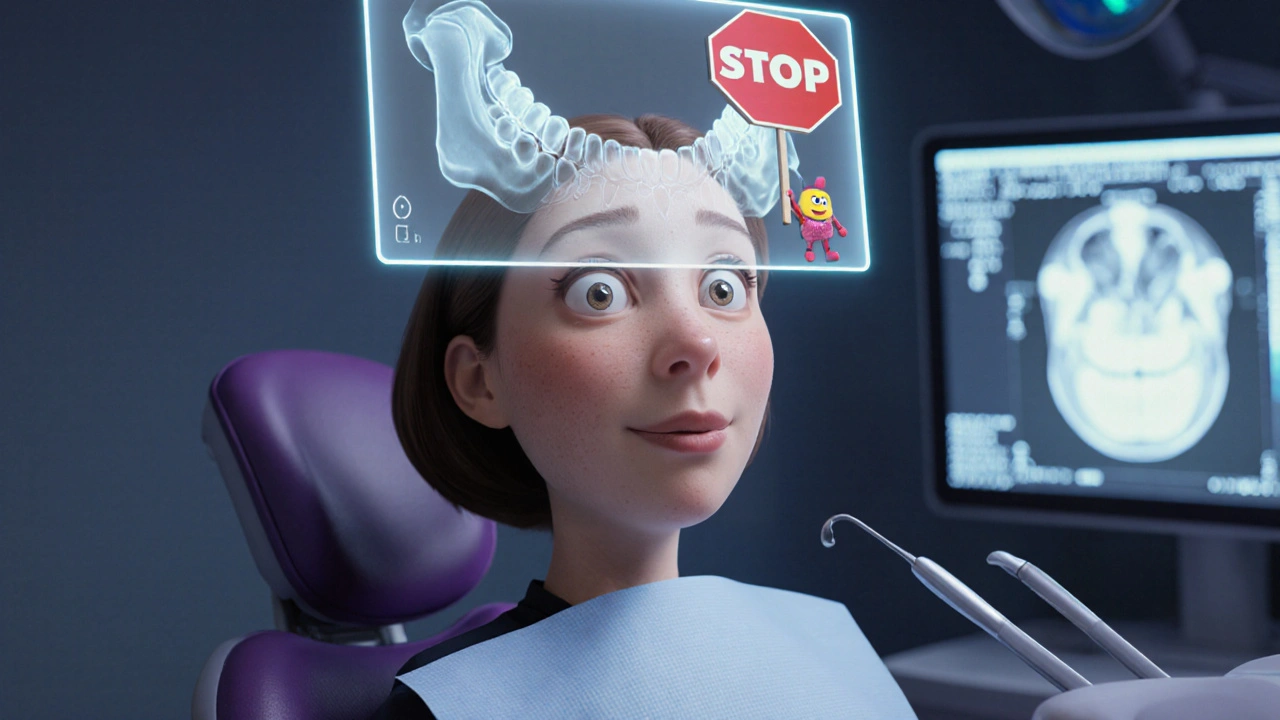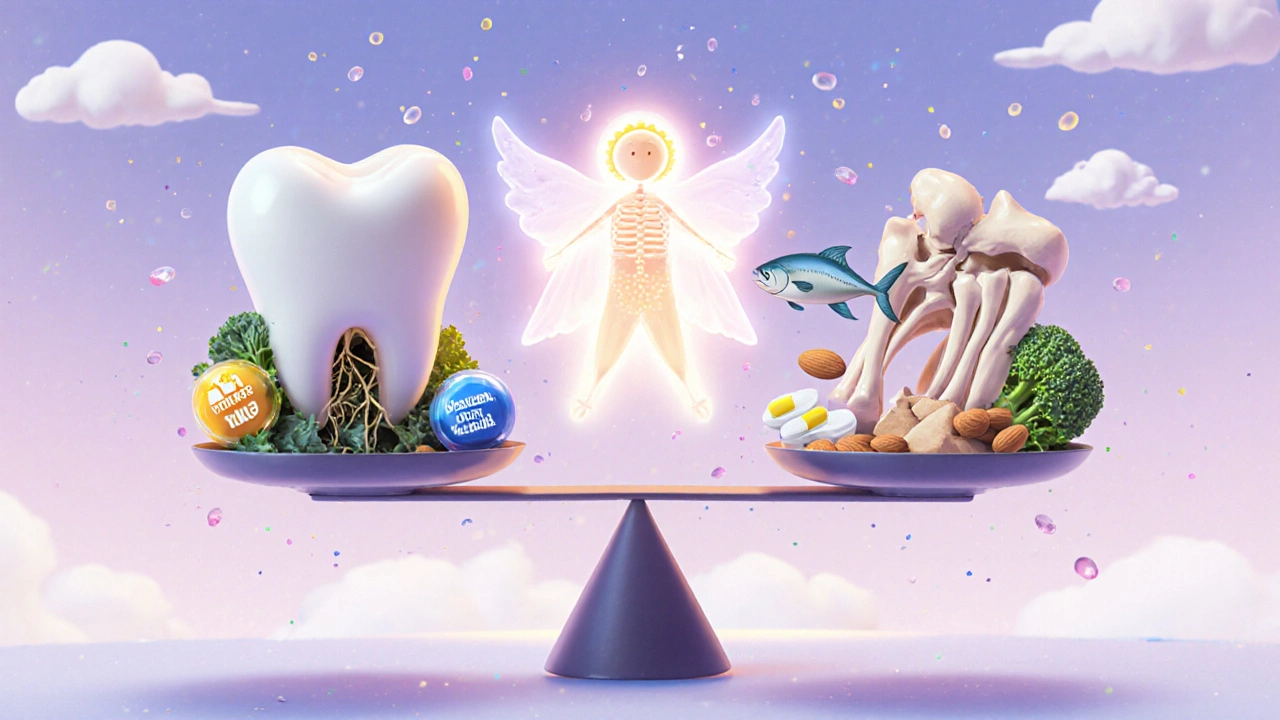How Calcitonin Supports Dental Health and Prevents Bone Loss in the Jaw
 Oct, 28 2025
Oct, 28 2025
Most people think brushing and flossing are the only things that keep teeth strong. But there’s a hidden player in your body that’s just as important-calcitonin. This hormone doesn’t get talked about in dentist offices, but it plays a critical role in protecting your jawbone and keeping your teeth anchored in place. Without enough calcitonin, your jaw can slowly start to dissolve, even if you never miss a brushing session.
What Calcitonin Actually Does in Your Body
Calcitonin is a hormone made by the thyroid gland. Its main job? To lower calcium levels in your blood by telling bone cells called osteoclasts to slow down. Osteoclasts break down old bone tissue, which is normal-but when they go unchecked, they eat away at bone faster than it can rebuild. Calcitonin acts like a brake. It doesn’t build bone, but it stops bone loss.
In your jaw, this matters because the alveolar bone-the part that holds your teeth in place-is constantly remodeling. Every time you chew, bite, or even grind your teeth, micro-stresses hit this bone. Healthy calcitonin levels ensure that the bone doesn’t break down too quickly. If calcitonin drops, your jawbone starts to resorb. That’s not just a dental problem-it’s a structural one.
Why Jawbone Loss Is Silent and Dangerous
Jawbone loss doesn’t hurt. It doesn’t make your teeth feel loose right away. You won’t notice it until your dentures no longer fit, your gums recede more than usual, or your teeth start shifting. By then, it’s often too late to reverse without surgery.
Studies show that people with low calcitonin-like postmenopausal women or those with thyroid disorders-have up to 30% faster jawbone density loss compared to others their age. This isn’t just about aging. It’s about hormone balance. Even if you’re young and healthy, a thyroid imbalance can quietly weaken your jawbone over years.
Calcitonin and Gum Disease: A Hidden Link
Gum disease (periodontitis) is often blamed on plaque and bacteria. And yes, those are the direct causes. But here’s what most people miss: bone loss from gum disease happens faster when calcitonin is low. The inflammation from gum disease triggers osteoclasts. Normally, calcitonin would step in and calm them down. When it doesn’t, the bone destruction speeds up.
One 2023 study tracked 217 adults with moderate to severe periodontitis. Those with below-average calcitonin levels lost 2.3 times more jawbone density over 18 months than those with normal levels-even when their oral hygiene habits were identical. That means two people brushing twice a day can have wildly different outcomes, simply because of hormone levels.

Who’s at Risk for Low Calcitonin and Dental Problems?
Not everyone needs to worry. But some groups are more vulnerable:
- Women over 50, especially after menopause
- People with thyroid disease (hypothyroidism, Hashimoto’s)
- Those who’ve had thyroid surgery
- People on long-term corticosteroids
- Individuals with chronic kidney disease
If you fall into one of these groups and have noticed your gums pulling away from your teeth, or your dentures feeling loose, it’s not just about aging. It could be your calcitonin levels.
How to Check and Support Your Calcitonin Levels
You can’t test calcitonin with a simple at-home kit. It requires a blood test ordered by a doctor. But if you’re concerned, ask your physician for a serum calcitonin test-especially if you have unexplained jawbone loss or periodontitis that won’t improve with standard treatment.
There’s no magic food or supplement that boosts calcitonin naturally. But you can support your thyroid and bone health with:
- Vitamin D3 (1,000-2,000 IU daily, based on blood levels)
- Magnesium (300-400 mg from food or supplements)
- Calcium from whole foods (kale, sardines, almonds), not just pills
- Reducing sugar and processed foods that spike inflammation
Some people with severe bone loss may be prescribed synthetic calcitonin nasal spray. It’s not common anymore-most doctors prefer bisphosphonates-but it’s still used in cases where other treatments fail. Always talk to an endocrinologist before starting any hormone therapy.

What Your Dentist Should Know
Most dentists focus on plaque, bacteria, and gum inflammation. Few connect those issues to systemic hormones. But if you have unexplained bone loss, bring up calcitonin. Show them your blood work. Ask if your jawbone loss pattern matches what’s seen in thyroid-related bone resorption.
Some dental clinics now use 3D cone beam scans to track bone density over time. If you’ve had one scan and your dentist says your bone is thinning, ask: “Could this be linked to hormone levels?” That question can open the door to a bigger solution than just more cleanings.
Real-Life Example: Linda’s Story
Linda, 58, had perfect oral hygiene. Brushed twice a day, flossed daily, saw her dentist every six months. But over three years, her lower denture kept slipping. Her dentist assumed it was just aging. Then she started losing teeth.
Her periodontist ordered a bone density scan and a thyroid panel. Her calcitonin was 60% below normal. She’d had a partial thyroidectomy years earlier and never followed up. After starting low-dose calcitonin therapy and adjusting her vitamin D, her jawbone stabilized. She didn’t get new teeth back-but she stopped losing more. Her dentures fit again.
She didn’t need surgery. She didn’t need implants. She just needed someone to look beyond her gums.
Bottom Line: Teeth Aren’t Just About Brushing
Your teeth don’t live in a vacuum. They’re rooted in bone that’s alive, constantly changing, and regulated by hormones. Calcitonin is one of the quiet guardians of your jaw. When it drops, bone loss follows-even if you’re doing everything right with your toothbrush.
If you’ve got unexplained gum recession, loose teeth, or dentures that no longer fit, don’t assume it’s just age. Ask about your thyroid. Ask about calcitonin. Your jawbone might be sending you a signal you’ve been ignoring.
Can calcitonin reverse tooth loss?
No, calcitonin cannot regrow lost teeth or regenerate bone that’s already gone. But it can stop further bone loss in the jaw, which prevents additional teeth from becoming loose or falling out. It’s a protective tool, not a repair tool.
Is calcitonin available as a supplement?
No, you can’t buy calcitonin as a pill or powder. It’s only available as a prescription nasal spray or injection, and only for specific medical conditions. Over-the-counter supplements claiming to boost calcitonin are not scientifically supported.
Does calcium intake affect calcitonin levels?
Calcium levels in your blood trigger calcitonin release. High calcium makes your thyroid release more calcitonin. But eating more calcium doesn’t raise calcitonin long-term. Your body regulates this tightly. The key is balance-not extra calcium.
Can stress affect calcitonin and dental health?
Yes, indirectly. Chronic stress raises cortisol, which can suppress thyroid function over time. Lower thyroid activity may reduce calcitonin production. Stress also increases inflammation, which worsens gum disease. Managing stress helps protect your jawbone from multiple angles.
Should I get my calcitonin levels checked if I have gum disease?
If your gum disease isn’t improving with standard treatment, or if you have other risk factors like thyroid disease, menopause, or steroid use, yes. Ask your doctor for a serum calcitonin test. It’s not routine, but it can explain why your bone is deteriorating faster than expected.
Evelyn Salazar Garcia
October 28, 2025 AT 21:11Clay Johnson
October 29, 2025 AT 07:54Jermaine Jordan
October 29, 2025 AT 22:16Chetan Chauhan
October 30, 2025 AT 23:41Phil Thornton
October 31, 2025 AT 04:22Pranab Daulagupu
November 1, 2025 AT 20:19Barbara McClelland
November 3, 2025 AT 00:33